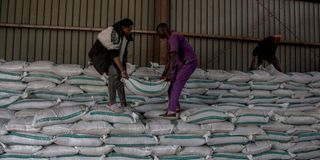NCPB starts sale of Sh2,500 subsidised fertiliser

Workers arrange bags of subsidised fertiliser after offloading them from a truck at the National Cereals and Produce Board depot in Elburgon, Nakuru County on August 5, 2023.
The National Cereals and Produce Board (NCPB) has commenced selling of subsidised fertiliser for Sh2,500 per bag ahead of the short-rains planting season in October.
NCPB says it has kicked off sale of the cheaper fertiliser to registered farmers in a major boost that has cut the cost of the input from Sh3,500 which has been the prevailing price of a 50-kilogram bag of the government-subsidised fertiliser.
“All the NCPB depots and selling centers are open and serving farmers efficiently, on a first-come-first-served basis, and are open from Mondays to Sundays,” said NCPB in a statement.
The firm says it has continued to partner with county governments to open more fertiliser-selling centres across the country in line with the government's objective of taking services closer to farmers.
“The fertiliser is sold through the E-Voucher digital system and is being distributed in depots and county selling centres that are currently participating in the short-rains subsidized fertiliser programme,” it said.
President William Ruto had two weeks ago announced the reduction of fertiliser prices to increase crop production as a means to lower the cost of food.
He urged farmers to consider increasing their use of the commodity to boost productivity.
“Since fertiliser is the game changer of agricultural productivity, this should translate to higher production in the next planting season. I encourage farmers to embrace better and greater use of fertiliser to increase yields in the coming season,” said Dr Ruto during a press briefing at State House.
The President said that the Kenya Kwanza administration’s Bottom-up Economic Transformation Agenda recognises that the country’s poor economic performance is primarily due to the underperformance of agriculture, hence the need to boost production.
“Agriculture’s contribution to employment, incomes, foreign exchange, cost of living and industrialisation has two related implications,” he said.
The fertiliser subsidy is the only major subsidy on commodities retained by Dr Ruto in his first budget, having withdrawn the subsidies on fuel and maize flour during the financial year 2022/23.
In the financial year 2023/24, the National Treasury allocated Sh5 billion to cater for distribution of subsidised fertiliser to thousands of farmers ahead of the short rains season in October.
The International Monetary Fund (IMF) has also backed the government’s fertiliser subsidy stating that it is key in lowering the cost of production even as it called for withdrawal of other subsidies especially on food and fuel.
“The package of policy measures announced by the government to increase food supply through imports particularly of sugar and maize, and production through fertiliser subsidy and irrigation are expected to provide relief in the short and medium term,” said the lender.





